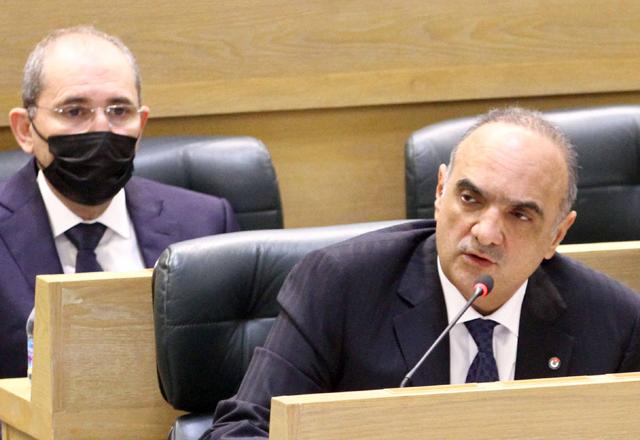- Local News
- Mon-2021-03-15 | 01:02 pm

Nayrouz News Agency :
Prime Minister and Minister of Defence Bisher Al Khasawneh on Sunday announced the construction of an oxygen plant by the Jordan Armed Forces-Arab Army (JAF) following the New Salt Public Hospital incident.
The announcement came during an emergency Lower House session where Khasawneh stated that the plant will be able to produce 600 cylinders within three weeks and 10 tonnes in the month of April.
During the session, he affirmed that the government bears responsibility for the New Salt Public Hospital incident, stressing the Cabinet’s keenness to address the causes of the accident and avoid its recurrence.
Conveying his condolences to the families of the deceased, he highlighted that "the government will not evade responsibility for the lack of basic services in hospitals” amid the spread of the coronavirus.
Khasawneh reviewed government measures taken in this regard by first mentioning the request made to conduct an independent investigation by the Judicial Council.
For his part, Minister of Interior and acting Minister of Health Mazen Faraiah explained that a report about the lack of oxygen in the isolation and intensive care units was received at 7:12am on Saturday.
In 18 minutes, the civil defence teams arrived to provide oxygen cylinders and resuscitation, he added, noting that deaths reached six before the designated company supplied the tanks with oxygen at 9:15am. At a later time, a total of three people passed away, whose cause of death were not determined, the minister said.
Faraiah added that the oxygen control measures include the need to inform the concerned company in case the percentage of oxygen reached 40 per cent, stressing that if the percentage reached 20 per cent, the system would issue a warning of the necessity of supplying.
In the event of reaching 5 per cent, the devices in the isolation and intensive care rooms issue a warning of danger to signal the lack of oxygen, which was not handled by the concerned hospital staff, the minister said.
He pointed to immediate measures taken by the government, including allocating civil defence cadres in hospitals and provider companies to monitor oxygen levels three times a day and ensure that the quantities are sufficiently available.
The said measures also involved assigning a specialised administrator in each hospital and following up with the two companies providing oxygen to the hospitals of the Ministry of Health and the Royal Medical Services, he said.









